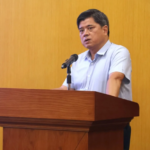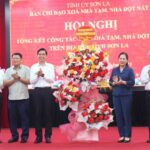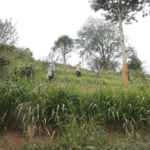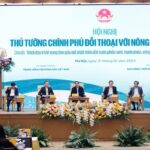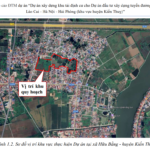On the afternoon of June 22, 2024, Prime Minister Pham Minh Chinh chaired the National Conference to review the National Target Program for Rural Development, the National Target Program for Sustainable Poverty Reduction, the “Whole Country Joins Hands to Build New Rural Areas” movement, and the “Leave No One Behind” campaign for the period of 2021-2025.
The conference was held at the Government Headquarters, connecting to the headquarters of the People’s Committees of provinces and centrally-run cities. Attending and co-chairing the conference in Hanoi were Do Van Chien, President of the Vietnam Fatherland Front Central Committee, and Deputy Prime Ministers Tran Hong Ha and Mai Van Chinh; and Le Minh Hoan, Vice President of the National Assembly.
PLACING ECO-AGRICULTURE, CIVILIZED FARMERS, AND MODERN RURAL AREAS AS THE PILLAR
In his directive speech at the conference, Prime Minister Pham Minh Chinh emphasized the pivotal role of rural development in socio-economic development, ensuring sustainable welfare and preserving national cultural identity.
The Prime Minister stated that after more than a decade of implementation, the rural development program has achieved remarkable results: 79% of communes meet the new rural criteria, 51% of districts have completed their tasks, and 12 provinces and cities have been recognized for completing their new rural development goals. The rural landscape has undergone significant changes in infrastructure, livelihoods, culture, education, and healthcare. Vietnam has been internationally recognized as a model for achieving the Millennium Development Goals, especially in poverty reduction, provision of clean water, and rural development.

However, alongside these positive results, the Prime Minister also pointed out existing shortcomings and limitations that need to be addressed. Some areas still have high poverty rates of over 50%, and while the emulation movement is vibrant, the reward system is not timely, and outstanding individuals have not been fully recognized.
Reaffirming the core values of Resolution 26-NQ/TW on agriculture, farmers, and rural areas, Prime Minister Pham Minh Chinh highlighted valuable lessons learned: the deep involvement of the Party’s leadership – from the Politburo, the Secretariat to the General Secretary; the unity of the entire nation; the pivotal role of farmers; and effective coordination with international friends.
“Correct policies, high consensus, effective implementation, and substantial benefits for the people are key. Farmers must experience the real results, not just empty promises.”
Prime Minister Pham Minh Chinh.
For the new phase, the Prime Minister set out the highest goal of developing a rich, civilized, and prosperous country, placing eco-agriculture, civilized farmers, and modern rural areas as the pillar. To achieve this goal, it is necessary to mobilize the entire political system to implement “4 strengthenings”: (1) Improve the institutional framework to place farmers at the center, agriculture as the driving force, and rural areas as the foundation; (2) Develop comprehensive, green, and sustainable strategic infrastructure; (3) Build a new generation of farmers who can adapt to technological revolution and comprehensive integration; (4) Diversify products, supply chains, and export markets, taking advantage of opportunities from potential markets such as Halal food with 2 billion consumers.
Regarding farmers, the Prime Minister emphasized “3 pioneers”: (1) Pioneer in escaping poverty and becoming rightfully wealthy; (2) Pioneer in building a model of civilized farmers who live responsibly; (3) Pioneer in green production, digital transformation, and especially in participating in the “Digital Learning for All” movement, towards becoming digital citizens in the digital economy.
The Prime Minister also requested ministries, sectors, and localities to urgently develop the National Target Program for Rural Development and Poverty Reduction for the period of 2026–2035, with a focus on integration, clear assignment of tasks, responsibilities, products, authority, and timelines.
Particularly, the Prime Minister highlighted the role of the state as a “catalyst” in mobilizing social resources and encouraging public-private partnerships. At the same time, it is necessary to continue improving mechanisms and policies to ensure social equity, leaving no one behind, and not compromising the environment and welfare for the sake of pure economic growth.
ORIENTATION TOWARDS 2035: COMPREHENSIVE AND MODERN DEVELOPMENT
Presenting a summary report on the review of the National Target Program for the period of 2021-2025 and the orientation for the National Target Program for Rural Development and Sustainable Poverty Reduction for the period of 2026-2035, Minister of Agriculture and Environment Do Duc Duy affirmed that the program has contributed to promoting eco-agriculture, civilized farmers, and modern rural areas. As a result, the living conditions of the people, especially in difficult areas, have improved significantly. Infrastructure in terms of transportation, healthcare, education, and culture in rural areas has been invested synchronously; the poverty rate has decreased rapidly; the economic and labor structure has shifted positively, gradually narrowing the development gap between regions.
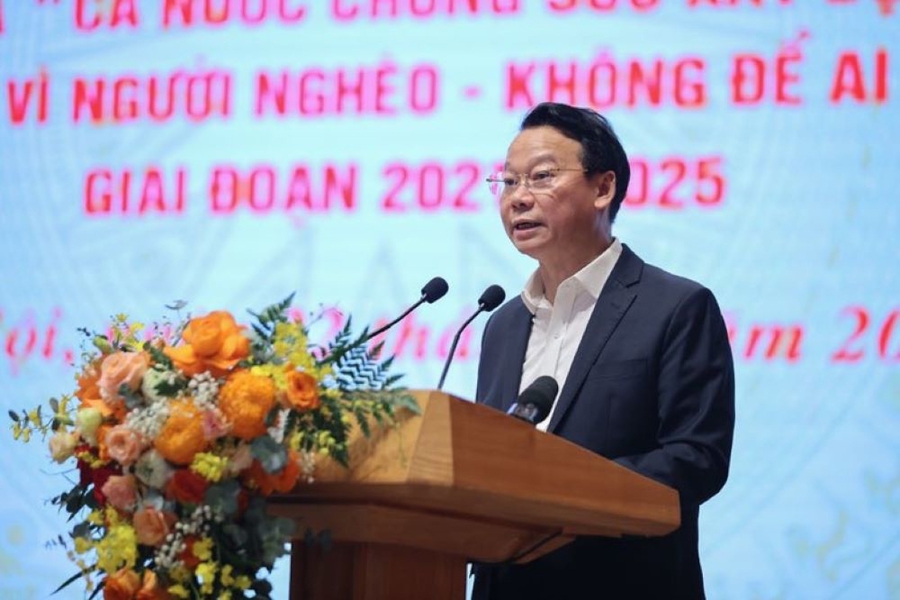
Minister Do Duc Duy proposed that the goal for the period of 2026–2035 is to build modern, comprehensive, and sustainable rural areas that are resilient to climate change. The focus should be on promoting rural economic development based on science and technology, innovation, and digital transformation; improving the quality of life, income, and access to services for the people, aiming for a standard of living comparable to urban areas.
Specific goals by 2030 include: doubling the per capita income in rural areas compared to 2020; reducing multidimensional poverty by 1-1.5% per year; at least 80% of communes meeting new rural standards, of which 35% meeting advanced criteria and 10% meeting modern rural standards. By 2035, striving for 90% of communes to meet new rural standards, 50% to meet advanced criteria, and 25% to meet modern rural criteria; the national multidimensional poverty rate to drop below 1%.
The Ministry of Agriculture and Environment set out 5 key tasks to create breakthroughs for the program in the period of 2026-2035.
First, continue to promote the comprehensive leadership of the Party, the strong direction of the Government and the Prime Minister, ensuring that the emulation movement is associated with social welfare and strengthening the people’s trust.
Second, Party committees, authorities, and leaders of agencies and units must play a pivotal role in organizing the movement; effectively coordinating with the entire political system.
Third, strengthen propaganda to raise awareness about the role and objectives of the rural development and sustainable poverty reduction programs.
Fourth, organize emulation movements with clear, practical content and criteria, closely following local realities, and placing the people at the center and as the driving force for implementation.
Fifth, strengthen inspection and supervision, promptly remove difficulties, and commend exemplary individuals and collectives, contributing to the widespread propagation of the movement in the community.
NEW THINKING: FROM PHYSICAL INFRASTRUCTURE TO HUMAN INFRASTRUCTURE
At the conference, leaders of localities and many ministries and sectors contributed practical opinions. Ha Giang Provincial Party Committee Secretary Hau A Leng shared that the province has a very low rate of communes meeting new rural standards due to difficult terrain, limited resources, and difficult lives of the people. He requested the Central Government to continue supporting localities that cannot balance their budgets, especially in strategic infrastructure such as transportation, electricity, and telecommunications.
“Each person must become the subject of change, and farmers should not only know how to produce but also be equipped with knowledge of governance, communication, market connection, and product storytelling.”
Mr. Le Minh Hoan, Vice President of the National Assembly.
Similarly, Dak Lak, a mountainous province with more than 50% of unpaved rural roads, also faces challenges in completing the new rural criteria. Nguyen Thien Van, Acting Chairman of the People’s Committee of Dak Lak province, suggested that the Central Government should consider factors such as terrain, poverty rate, and income when allocating capital, ensuring fairness between regions.
Meanwhile, Thanh Hoa province has achieved impressive results, reducing the poverty rate from 27% in 2010 to over 4.7% in 2024. Provincial Party Committee Secretary Nguyen Doan Anh shared that 15 out of 26 districts have achieved new rural standards, but there are still dozens of difficult communes in need of support to achieve the new goals.
Vice President of the National Assembly Le Minh Hoan emphasized that in the new phase, the focus should shift from investing in hard infrastructure to investing in “human infrastructure” – the rural residents themselves. Each person must become the subject of change, and farmers should not only know how to produce but also be equipped with knowledge of governance, communication, market connection, and product storytelling.
Mr. Hoan proposed integrating the rural development and poverty reduction programs to avoid fragmented resource allocation, while adjusting the rural planning mindset. Planning should not only focus on agricultural production but also shape the economic development space, revive traditional villages, develop tourism, attract investment, and promote smart agriculture startups.
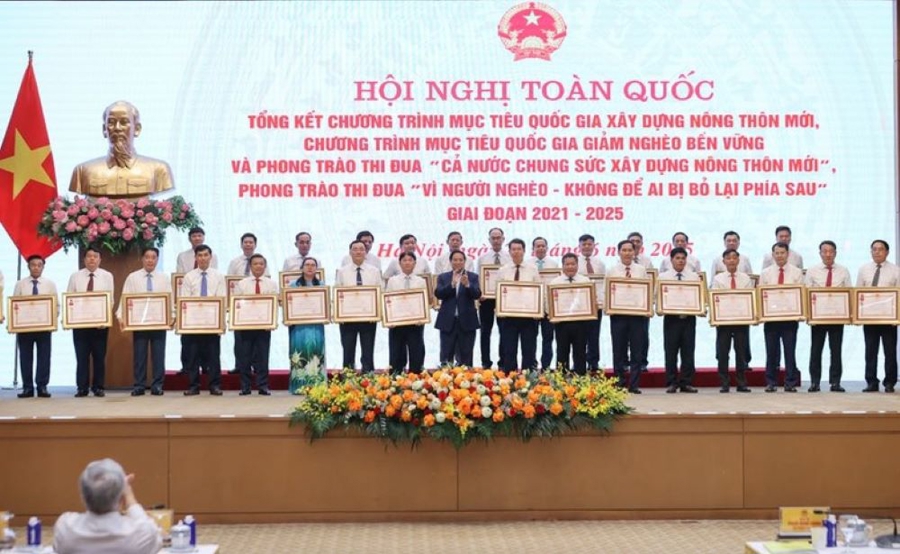
At the conference, the Ministry of Home Affairs announced the decisions of the President and the Prime Minister to reward 306 typical collectives and individuals in implementing the National Target Programs and emulation movements.
Specifically, 31 districts of 12 provinces, including 12 districts meeting advanced new rural criteria and 19 districts meeting new rural criteria, were awarded the Labor Order, third class, by the President; and 275 collectives and individuals were awarded Certificates of Merit by the Prime Minister.
Leaving Behind ‘Eradicating Hunger and Poverty’, It’s Time for the Nation to Race Towards Prosperity
Initiating a nationwide movement for a competitive and prosperous society is about unleashing everyone’s potential and igniting a spirit of healthy competition and economic development.
Carbon Credit Sales: Empowering Farmers to Prosper
Ecological agriculture and circular farming are not just methods of cultivation, but a philosophy that strives for long-term sustainability for both people and the planet. With a shared goal of achieving Net Zero by 2050, Vietnam’s agricultural sector is undergoing a transformation towards ecological farming practices to protect natural resources and community health, paving the way for a green, clean, and resilient future.
The Green Revolution: 9 Key Issues for Developing an Eco-Friendly Agriculture, a Modern Rural Economy, and a Cultured Farmer
“On December 31st, Prime Minister Pham Minh Chinh chaired a conference with farmers, themed ‘Igniting the Aspiration for Prosperity to Build a Prosperous and Happy Nation; Confidently Stepping into the New Era.’ The Prime Minister emphasized the need to review and refine policies to accelerate and boost the goal of developing ecological agriculture, modern rural areas, and cultured farmers.”



























